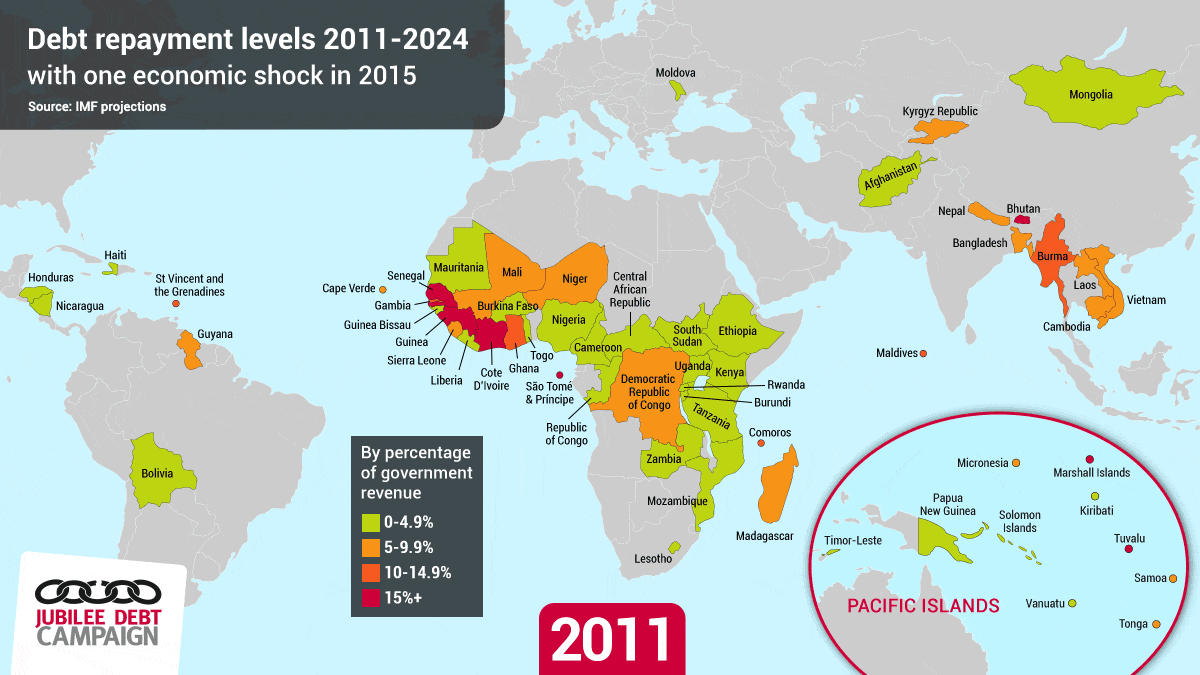Definition Third World Debt: Third world debt is the external debt that governments in developing countries owe to foreign banks and foreign governments.
Many of the countries with third world debt, gained their independence post-1945. Some countries like Indonesia acquired debts from the colonial rulers (Dutch) but for most countries their debt accumulated during the 60s, 70s and 80s.

This shows the burden of debt faced by developing economies. When debt repayments are over 5% of government revenue, it becomes difficult to get on top of debt levels. It shows that the burden of third world debt is expected to rise to 2022.
Why Third World Debt Increased
1. Investment for Structural Adjustment.
In the post-war period, many developing countries adopted a policy of import substitution and industrialisation. What this meant is that they sought to diversify their economy from being based on agriculture to investing in manufacturing industries. This required investment and this investment was funded by external borrowing. The loans were seen as helping to develop third world economies. However, not all loans were used for investment in infrastructure. Corruption syphoned off approx 20%
2. Banks Willing to lend.
In the 1970s, banks were eager to lend to developing countries. The theory was that ‘governments don’t default’. Banks have been criticised for irresponsible lending and failing to make sure loans were realistic. Citibank chairman at the time, Walter Wriston, said that lending to governments was safe banking because sovereign nations do not default on their debts. This is one reason why external debts became so large – private banks never imagined default would occur.
3. Oil Crisis 1973
The oil crisis of 1973, hit developing countries. Firstly, they were reliant on oil imports. Secondly, the attempts at industrialisation meant their demand for oil was greater. However, with oil prices tripling, they couldn’t afford the oil imports, so many countries borrowed to be able to continue importing. It was in the 1970s when levels of external debt really increased to difficult levels
4. Inflation and Interest Rates.
The oil price shock also caused inflation and therefore higher interest rates. This meant that third world countries were faced with both higher debt, but also a higher % of debt interest payments.
5. Slow Growth in 1970s and 1980s.
The expected boom in economic growth didn’t materialise, especially in sub-Saharan Africa. The investment in industrialisation gave poor returns, partly due to lack of sufficient labour skills and lack of previous expertise. Import substitution proved a poor policy for economic development. With rising oil prices, poor harvests and falls in agricultural prices (partly due to the EEC CAP) developing countries had a fall in economic growth, leading to lower tax revenues.
6. Decline in Credit Ratings
As countries experienced problems repaying, their credit rating was reduced. This made it more difficult and expensive for countries to service their debt.
7. Collapse of Soviet Aid.
In the Postwar period, the Soviet Union often lent to developing countries as part of the surrogate cold war. But, in the 1980s, funds from the Soviet Union dried up.
8. Fixed Exchange Rate
Some Countries experienced debt because of their efforts to maintain a fixed exchange rate. For example, in an effort to prevent inflation, during the 1980s, Argentina adopted a fixed exchange rate to prevent inflation. The idea was that if the government wanted to print more money, they had to hold an equal amount of dollars. In the old system, the government could just print more money and this caused inflation. In the new system, they could only print more money if they had more dollars. But, the government desperately wanted to print money so they started to borrow dollars. Eventually, this external debt became unmanageable and Argentina started to default.
Should We Write Off Third World Debt?
Reasons to write off debt
- Greater equality. Third world debt is a small % of the income of the developed world. To write it off doesn’t have a significant impact on our GDP. It does have significance for the developing world, where debt levels are a much higher % of GDP.
- Developing countries spend high % of foreign earnings on debt interest payments, leaving little room for capital investment. Writing off debts enables them to invest in infrastructure leading to higher economic growth.
- The developed world will benefit from strong third world countries because they are potential export countries.
- In many cases, countries have already paid significant interest on the debt, they just haven’t been able to repay capital.
Reasons to be concerned about writing off Debts
Moral Hazard. If debt always gets written off, it may encourage countries firms to take on more debts and then hope they get written off.
If debt write off is too generous, banks may be unwilling to lend to these countries in the future leaving them short of finance.
Meaning of Third World Debt
Third world debt refers to the outstanding sums countries in the third world (developing countries) owe to banks and governments in the developed world.
Related

BECOUSE OF PREARING RESEARCH
this is interesting and good
1.elucidate five cons why the appetite of credit has grown in third world countries to the economy and its citizenry
2. explain five rationale underpinning use of eurobond by emerging economies
kindly check
Jeez, the only actual information here is “What is the official propaganda endorsed by the IMF and the US government?”. This article not only ignores but actively distracts from the mandatory Structural Adjustment Programs enforced by the IMF on all of Latin America, Sub-Saharan Africa, and most of eastern Europe in the 80s and 90s, forcing all of those nations to dismantle their national economic infrastructure and actively hamstring their own economies under threat of global sanctions.
https://www.sciencedirect.com/science/article/abs/pii/S0049089X18300802
Virtually all nations have foreign debt, but it’s only the poorest ones that are forced to surrender all local economic control for the privilege of continuing to do so.